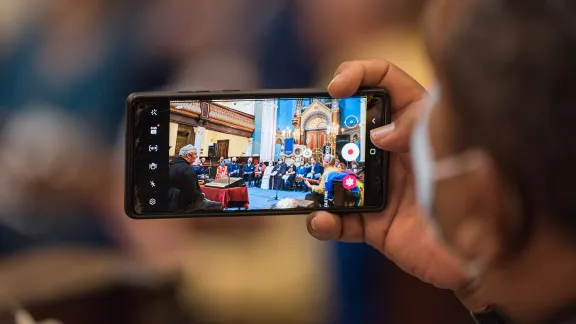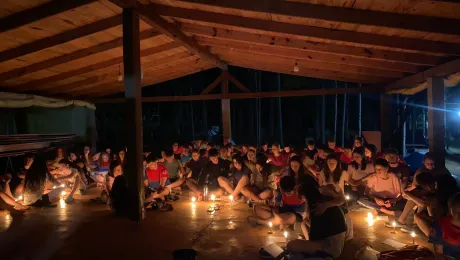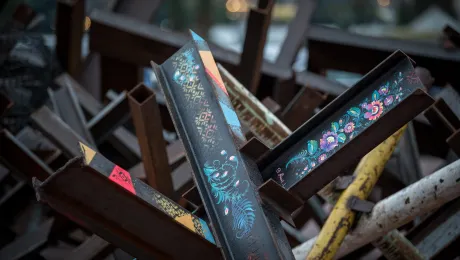
Filming parts of an interfaith service in Garnethill Synagogue, Glasgow, on the opening day of the U.N climate change conference COP26, with representatives from more than ten different religions. Photo: LWF/Albin Hillert
Short films from Asia, Middle East and North Africa showcase positive stories of interreligious relations
(LWI) - Organizers of a short film festival, featuring contributions from India, Tunisia, Iraq and Indonesia, have highlighted the importance of this genre in promoting positive models of interfaith relations. The Norwegian Center for Holocaust and Minority Studies joined with The Lutheran World Federation (LWF) and other partners to showcase a selection of stories and documentary films which seek to counteract the rising tide of extremism and xenophobia in many countries of the world today.
The UN’s Special Rapporteur on Minority Issues, Fernand De Varennes opened the online event, praising the film directors for their work to discover and explore examples of religious diversity in the different regions. In the face of growing intolerance including hate speech and violence towards minorities, he said, it is vital to “reach out with stories that remind us of our common humanity.”
Participants watched short clips from the films which are available for viewing on the webpage of the Norwegian Center’s Inclusive Citizenship and Human Rights project. Award winning Indian documentary film director Pankaj Butalia spoke about the way in which images are able to break down “the stereotyping which is the backbone of hate speech,” he said. Films are an important tool for engaging people and creating greater awareness of the multiple layers of religious identity which characterize a country like India, he added.
Connecting hearts and minds
Ayari Ghassen, director of a short film entitled ‘Pilgrims in Tunis’, underlined the way in which the arts can play a major role in educating young people about the history and traditions of religious minorities in their countries. By highlighting common ground between people of different faith communities, he said, films are able to create an emotional connection with the viewers, rather than simply requiring a rational response from them.
Also taking part in the panel discussion was Rasha Saba from Minority Rights Group, another partner in the festival’s organizing team. She noted how films “offer a good entry point for discussion, even among those who are not interested in social justice and peace work.” They can also help to promote a sense of accountability without demonizing communities that have been responsible for the persecution of religious minorities, she added.
Mark Latimer, executive director of the Ceasefire Centre for Civilian Rights said film also “enables you to convey the positive experiences of religious communities,” a vital part of the work to prevent violence and conflicts. He also spoke about the importance of finding ways to effectively share such resources to combat the algorithms of social media “which deliberately front hate speech” and promote harmful stereotypes.
Education and advocacy tools
Dr Sriprapha Petcharamesree, senior advisor to the ASEAN university network for human rights education, stressed that learning requires a combination of imparting knowledge through different tools. As a human rights educator, she said, it is evident that “these are not easy issues to discuss and students may not understand our vocabulary but films can simplify the language.” Questions of ethnicity and religion are “both private and political,” she said, “so people often “avoid discussion about such visceral and sensitive issues.”
The online discussion was moderated by LWF’s Program Executive for Public Theology and Interreligious Relations, Rev. Dr Sivin Kit, together with Dr. Ingvill Thorson Plesner, Network Coordinator with the Norwegian Center for Holocaust and Minority Studies. Participants pointed to a variety of online training resources available on their websites which offer tools for advocacy at local, national and international levels.
Special Rapporteur Fernand De Varennes concluded with an invitation to all those present to expand their work over the coming year which will mark the 30th anniversary of the UN’s declaration on the rights of minorities. Films, he said, are “a powerful tool to approach human rights and overcome stereotypes, by celebrating diversity and giving voice and visibility to minority communities.”
LWF/P. Hitchen


